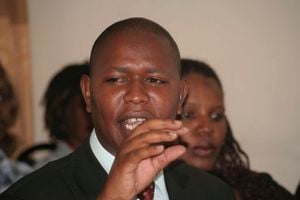Norwegian Foreign minister speaks on Kenya-Somalia maritime border dispute

Norway Foreign Affairs Minister, Espen Barthe Eide, while speaking at the University of Nairobi on June 6, 2024.
Norway’s Foreign Minister Espen Barth Eide admits double standards of his country’s allies are hurting global peace bids, including in the search for peace in the region.
At a public lecture in Nairobi, Eide said he had been appalled at how some countries in the West spoke one thing today and violated it the next when addressing different conflicts.
Eide was speaking at the University of Nairobi on bilateral relations between Norway and Kenya, discussing both countries as “multilateralists and partners for peace and security in a divided world.”
He praised Kenya’s involvement in regional peace bids, arguing that a volatile neighbourhood could only attract a burden on Nairobi. But his arguments inevitably drifted towards current active conflicts such as Gaza, Ukraine, Sudan and the Democratic Republic of Congo.
“I have been very vocal in criticising many of my Western friends for not being clear on this situation…Some say out there, actually many key countries, ‘Look, the principles are not applied equally across the planet, so there are no principles.’
“That is a dangerous path. The right way to say this is principles are not being applied equally around the planet so we have to make sure they are applied equally across the world,” he said, referring to the issues of Ukraine and Gaza, specifically.
Both have taken up global attention, but they have seen a varied, even contradictory response from Western powers such as the US, UK and Germany. While they rallied the world against Russia’s invasion of Ukraine, they haven’t been as energetic to limit Israel’s excesses in Gaza.
Eide said Israel failed to make a clear distinction between fighters, military and civilians and did not observe the principle of proportionality, which is you shall not use military force beyond what is necessary.
“We have a terrible suffering in Palestine inflicted by Israeli response to what was initially a terrorist Hamas attack in Israel, but all use of military force, has to be restrained by the rules of warfare, international humanitarian law and we feel Israel is in grave violation of these principles of international humanitarian law,” he said.
He steered clear of the genocide debate, however, indicating the case filed by South Africa against Israel should clarify the issue.
And he argued rules of war should apply equally to everyone, including appropriate punishment for those who break them. The US cheered when Russian leaders were indicted by the International Criminal Court but reacted angrily after Israeli leaders were indicted by the same Court. The US Congress threatened sanctions on the Court officials last week.
Norway, like Kenya, he argued, identifies development as based on a rules-based multilateralism. The current situation, however, has led to anarchy, with people acting while knowing they could dodge penalties due to their actions.
“We have been working closely with Kenya on the peacebuilding of Sudan and South Sudan and the Horn of Africa as well as the DRC and the neighbourhood around there. All these crises need our attention. They need a consistent and principled approach,” he said.
He did admit world attention focusing on the Gaza and Ukraine situations means other crises, especially in Africa, are being neglected.
Sudan’s war began earlier than Gaza’s, but the world also failed to mediate a ceasefire, leading to continual fighting to date. At least 18,000 people have died since then, as fighting between the Sudan Armed Forces and the Rapid Support Forces goes on.
Norway and Kenya have had diplomatic relations for the last 60 years. This year marks a commemoration of the ties as the two sides reflect on the challenges such as poverty and the Cold War to today’s, such as climate change, political instability and…poverty.
“These are the areas that are very crucial to mankind and require international cooperation. Sadly, this is affected by the return of geopolitical competition. We need to build trust in multilateral institutions in order to save lives, economies and help countries thrive because this also makes us thrive,” he said.
Eide used the occasion to clarify Norway’s role when Kenya and Somalia fought at the International Court of Justice over a maritime boundary. A Norwegian diplomat had tried to mediate long before Somalia sued Kenya and won at the ICJ. But rumours had also risen about Norway fueling the court case.
“We have no bilateral problems. On the contrary, we have a lot of common concerns about the world and about the neighbourhood,” he said of the rumours then. Norway had denied any ill role at the time.
“And I think what we will be speaking about is how we can further strengthen our cooperation on Sudan, South Sudan, Horn of Africa, DRC, but also on the global arena like UN reform and UN financial or international financial system reform,” he said.





